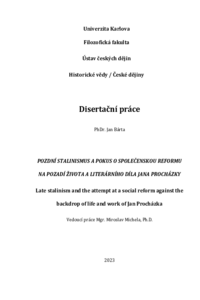Pozdní stalinismus a pokus o společenskou reformu na pozadí života a literárního díla Jana Procházky
Late stalinism and the attempt at a social reform against the backdrop of life and work of Jan Prochazka
dizertační práce (OBHÁJENO)

Zobrazit/
Trvalý odkaz
http://hdl.handle.net/20.500.11956/181022Identifikátory
SIS: 169376
Kolekce
- Kvalifikační práce [25012]
Autor
Vedoucí práce
Oponent práce
Mervart, Jan
Czesany Dvořáková, Tereza
Fakulta / součást
Filozofická fakulta
Obor
České dějiny
Katedra / ústav / klinika
Ústav českých dějin
Datum obhajoby
26. 5. 2023
Nakladatel
Univerzita Karlova, Filozofická fakultaJazyk
Čeština
Známka
Prospěl/a
Klíčová slova (česky)
kulturní dějiny|dějiny filmu|dějiny literatury|KSČ|reforma socialismu|rok 1968Klíčová slova (anglicky)
cultural history|history of cinema|history of literature|Czechoslovak Communist Party|reform of socialism|year 1968Cílem předložené disertační práce je charakterizovat prostřednictvím života a uměleckého díla Jana Procházky etapu československých dějin mezi pozdním stalinismem druhé poloviny 50. let a pokusem o reformu socialismu v roce 1968. Procházka coby spisovatel, filmový tvůrce, funkcionář a politický aktivista výrazně ovlivňoval někdejší kulturní i politické dění a předmětem zájmu je mapovat tyto jeho aktivity, vysledovat aktérem volené strategie a nastolovaná témata, kterými zasahoval do diskusí o reformě socialismu především v 60. letech, kdy se plně etabloval v uměleckém prostředí. Práce se opírá o dvojici stěžejních přístupů, jednak teorii sociálních polí konceptualizovanou francouzským sociologem Pierrem Bourdieuem, a dále o přístupy kulturně-historické. Hlavním pramenem je Procházkovo dílo (resp. šířeji pojaté texty, scénáře, beletrie, publicistika) a další texty, jež se k Procházkovi vztahují (recepce ze strany umělecké kritiky, reakce stranického vedení, zápisy vyjadřující vyjednávání konkrétních děl v prostředí stranického aparátu, denní tisk). Práce tím zasazuje Procházkovu osobnost a dílo do širších souvislostí kulturních, politických a společenských dějin sledované doby. Biografie není vystavěna do nejvíce ustálené životopisné osy narození, život, dílo, konec života, ale v souladu s volenou...
The aim of the presented doctoral thesis is to characterise the time period of Czechoslovak history between the late stalinism of the fifties and the attempt at reform of socialism in 1968 through the life and work of Jan Procházka. Procházka as a writer, screenwriter, office bearer and a political activist markedly influenced the political and cultural events of his time. The subject matter of this thesis is to map his activities and strategies with which he entered the discussions about the socialism reform in the sixties, when he fully established himself in the art milieu. The work is based on two approaches, the first being the theory of social capital by the french sociologist Pierre Bourdieu and second the cultural-historical approach. The main source is Prochazka's opus (all his written works) and other texts closely related to his persona (opinions of art critics, reactions of party directorate, daily press). This biography doesn't follow a typical scheme such as birth, life, work, death, but in accordance with the chosen theory the main character is inserted into the respective social fields. His functioning within these social spaces makes the content of the individual chapters, ranged chronologically. Moreover, the thesis deals with Prochazka's functioning in the Czechoslovak Youth...
